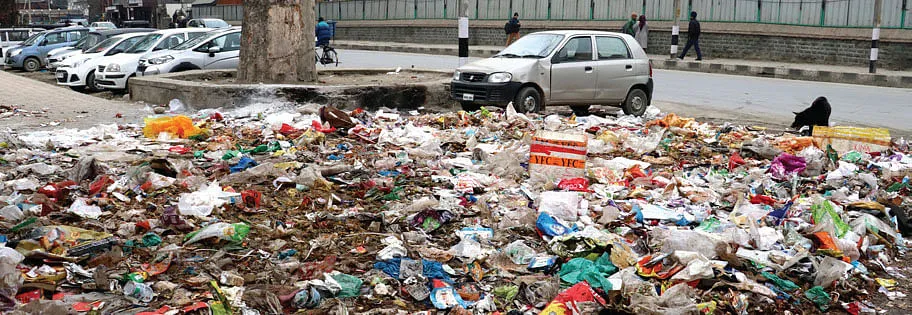According to last agriculture census of 2010-2011 theaverage agricultural land holding in India was 1.15 hectares. This means an average farmer owns 22 kanalsof land in India. Land holding was much lower in case of Jammu & Kashmirie 0.62 hectares which means 11 to 12kanals. The figure is much lower in case of Kashmir valley 0.45 hectares. Thismeans on an average a Kashmiri farmer owned 8 to 9 kanals of agricultural landas per 2010-2011 census . Agricultural and Land Revenue experts from J&K saythat agriculture census 2010-11 was much exaggerated as the actual landholdingwas only 5 to 6 kanals and as on date this is much lower (4 kanals maximum).In-fact I have written about this in past in local and national dailies. TodayI am again raising the issue of shrinking land area of Kashmir. The dearth ofland is not only affecting our daily lives but this is becoming a big challengefor Municipal bodies as they are not able to even find a suitable space fordisposal of municipal waste. Most of the municipal bodies in J&K don’t havea designated landfill site and with the result the garbage lifted fromdifferent towns is either collected on roadsides or dumped illegally on stateland most of which is located near thebanks of water-bodies (canals, streams, rivers and lakes). Once the water levelincreases in rains the garbage gets washed away posing serious health hazardsbecause source of our water supply schemes are these rivers and streams.
Pulwama firing incident
Recently a young man was injured in a firing incident duringa protest at Wahibugh village of Pulwama. The local residents were protestingagainst the dumping of Municipal Solid Waste (MSW) at Pohnad area of villagewhich is a Kah Charai land located near Romshu nallah. The said land has beenreportedly acquired by MunicipalCommittee Pulwama for being used as garbage dumping ground. From last several years Municipal CommitteePulwama is trying to find a piece of land for dumping its municipal solid waste, but due to scarcity of land in the area, the municipality had finally chosento use land around Wahibugh which is 6 kms outside town, but locals areresisting this move. I am sure Pulwama municipal committee won’t get landanywhere in the district for creating a landfill site. The reason is dearth ofland and population growth.
Illegal dumping sites
There are more than 50 illegal dumping sites created byvarious municipal councils and committees across J&K. Not even 20 %municipal institutions have a propergarbage dumping ground. If I talk about scientific landfill site to be designedas per Municipal Solid Waste Rules 2016 then we have not even a one such sitein entire state of Jammu & Kashmir. With the result municipal bodies dumpits solid waste unscientifically. The Municipal Committee Magam dumps its wasteon the banks of Ferozpur nallah, Municipal Committee Kulgam uses nallah Vishawfor garbage dumping and in Bandipora the municipal solid waste is dumped atZalwan area located near Wullar lake. Chadoora , Ganderbal, Charar Sharief,Udhampur, Ramban, Tangmarg and many other municipal committees don’t have anydumping site at all.
We cannot blame Municipal institutions for illegal dumpingof solid waste. They don’t do it deliberately. This is an issue which needs tobe deliberated upon seriously by our IAS officers in civil secretariat. There will be more protests and agitations bypeople in future as valley is getting chocked in trash. On daily basis valleygenerates more than 700 metric tons of waste , where shall this go ? Srinagar’slandfill site at Achan is 95 % filled and new site is yet to be identified. IfSMC acquires some land in nearby Pampore, Ganderbal or Budgam, there will againbe protests and firings.
Here is the solution ?
1. Governmentmust completely ban plastic bags, disposable goods and packaging items.
2. Religiousleaders must come forward and speak out against ill effects of plastic. ThePlastic ban doesn’t mean only banning polythene bags, but even food items ,chips packets and thermocol packing should be banned in J&K.
3. In-housecomposting of organic waste should be enforced on house-holds with ½ kanal landor more in cities and towns. This will reduce the load on garbage dump sites
4. RuralSanitation Department must be held accountable for failing to undertake wastemanagement work in Rural areas as mandated under Swach Bharat Mission Grameen.NREGA funds be utilized for waste management in rural areas.
5. Sale offood items packed in plastic be immediately banned in Tourist places and peoplebe heavily fined for littering.






